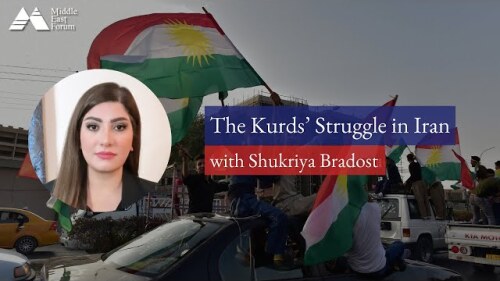|
|
Dexter Van Zile, managing editor of the Middle East Forum’s Focus on Western Islamism (FWI), spoke to a February 3rd Middle East Forum Webinar (video) about a lawsuit brought against Hamline University in St. Paul, Minnesota for firing an art history professor accused of “Islamophobia” for displaying images of Muhammed in class. The following is a summary of Van Zile’s comments:
The images in question shown by Erika López Prater, an adjunct faculty member at Hamline University, were “pious images of Muhammed” from the 14th century drawn by Muslims who venerated their prophet. The professor had issued multiple “trigger warnings” in advance of the art history lecture to her students, which she also sent to the administration and the university’s art department in the class syllabus. The professor excused any students who would take offense from viewing the images and, according to the lawsuit’s legal brief, there were no objections to the professor’s planned presentation.
After López Prater presented the images in her October lecture, Aram Wedatalla, a student and president of the university’s Muslim Students Association, informed the professor that the display offended her. The professor then notified the administration of the student’s complaint. Not long after, a senior university administrator issued a statement that the professor’s display of the images were “undeniably ‘Islamophobic’” and, as a consequence, the university was severing its relationship with López Prater, despite the many positive reviews she received from her students. The professor’s lawsuit against Hamline charged the university with religious discrimination and defamation. A statement issued by the Foundation for Individual Rights and Freedom (FIRE) said that Hamline “failed in its obligation to protect academic freedom.”
The controversy escalated in December when Jaylani Hussein, the director of the Minnesota chapter of the Council on American-Islamic Relations (CAIR), appeared at a videotaped campus meeting. According to the legal brief, Hussein warned that the offensive display could result in “another Charlie Hebdo situation.” Hussein’s “shocking” reference to the 2015 massacre of cartoonists at a French publication waged by jihadists offended at the display of Muhammad images “was kind of an implicit threat.” Although the video of the campus meeting has yet to be released, it should provide the specifics of Hussein’s comments during the discovery phase of the case.

“Muhammad Receiving His First Revelation From the Angel Gabriel,” a 14th-century Persian illustration taken from Jami’ al-Tawarikh (Compendium of Chronicles). Hamline U. in St. Paul, MN, declined to renew the contract of an art history instructor who presented the painting in an online class after Muslim students said it offended them. (Photo via Wikimedia Commons.)
Hamline University sacrificed its “institutional sovereignty” after Hussein “injected an element of fear” into the debate about academic freedom and the display of the Muhammad images “that simply does not belong on a college campus anywhere.” At a January press conference, Wedatalla tearfully recounted how traumatized she was at seeing the Muhammad images, reinforcing the notion that Muslims need “protection” as a “fragile [and] victimized minority.” CAIR Minnesota promotes a “grievance victim narrative” that Muslims in the U.S. are “hapless perpetual victims of oppression in the West,” when the reality is that Muslims practice their faith freely in this country. CAIR’s national headquarters weighed in on the controversy after realizing that CAIR Minnesota “took it too far” and contradicted the local chapter’s assessment by saying “this was not an instance of ‘Islamophobia.’”
Both the American Association of University Professors and Hamline’s faculty came out in support of López Prater, with the faculty demanding the resignation of the university president. They recognized that their colleague, a “good liberal” who ascribes to the “diversity, equity, and inclusion” agenda sweeping American institutions, was unprotected even after offering her warnings “in good faith.” At January’s press conference, Hussein said the professor’s “trigger warnings” were “proof” she knew she was wrong. That was a clear sign to the faculty that “one of their own ... was basically being subjected to the equivalent of a witch trial” which could just as easily target them.
In recent weeks, the combination of the lawsuit and negative publicity prompted the university to issue an apology for their “misstep” in accusing López Prater of “Islamophobia.” Disappointingly, the school newspaper, the Hamline Oracle, portrayed the event as an “insult to Muslims.” By working in tandem with the Sahan Journal, a local newspaper representing Minnesota’s immigrant community which “doesn’t really have any connection” to the university, the Hamline Oracle is eschewing its “editorial independence.” The student paper went as far as to remove a faculty member’s opinion piece in defense of López Prater’s expression of academic freedom because of the “alleged harm” to Muslim students on campus. The school paper’s refusal to challenge the administration’s mistakes essentially denies university students a voice.
The Hamline Oracle’s refusal to challenge the administration’s mistakes essentially denies university students a voice.
“Islamophobiacs,” a term Van Zile ascribes to those who use accusations of “Islamophobia” to “protect Muslims who behave badly” from any scrutiny or criticism, silence “honest discussion about political Islam or Islamism in the modern world.” The phenomenon is attributable to “grievance appropriation.” In the aftermath of the Holocaust and World War II, the realization that scapegoating Jews led to “civilizational disaster” required a reckoning in how cultures historically victimized the Jewish people. Post-Holocaust it was “taboo” to portray Jews as they were previously regarded and discussed. The “grace” period afforded to Jews has since eroded, and during the late 1990s and early 2000s, falsehoods about Israel and Jews re-emerged in the “polemics about the Arab-Israeli conflict,” which are “recapitulations” of earlier historical smears leveled against Jews.
The “appropriation” Van Zile said activists adopted was the idea that Muslims are victims of what Jews underwent in the mid-20th century, with the expectation that Muslims largely should be “given a pass” in confronting “misdeeds.” Many U.S. Muslim leaders, “and even some Islamist leaders,” are acknowledging that this approach is counter-productive. In the meantime, the media largely avoid portraying Muslims in a negative light. Accordingly, the “Islamophobia” of intra-Muslim violence in Muslim majority countries is given short shrift in the West, while discussion in the U.S. about political Islam’s impact on world politics will “get [you] into a lot of trouble.”
In an FWI interview Van Zile conducted with Ismail Royer, a former jihadist who has criticized CAIR for promoting grievances in its Muslim-as-victim narratives, Royer said he believes the organization should instead “promote ... the public good.” He said, “No civilization can recover when it is resentful and defensive, and this is the problem in Islamic civilization. It’s also something that we need to reflect on in America.”




